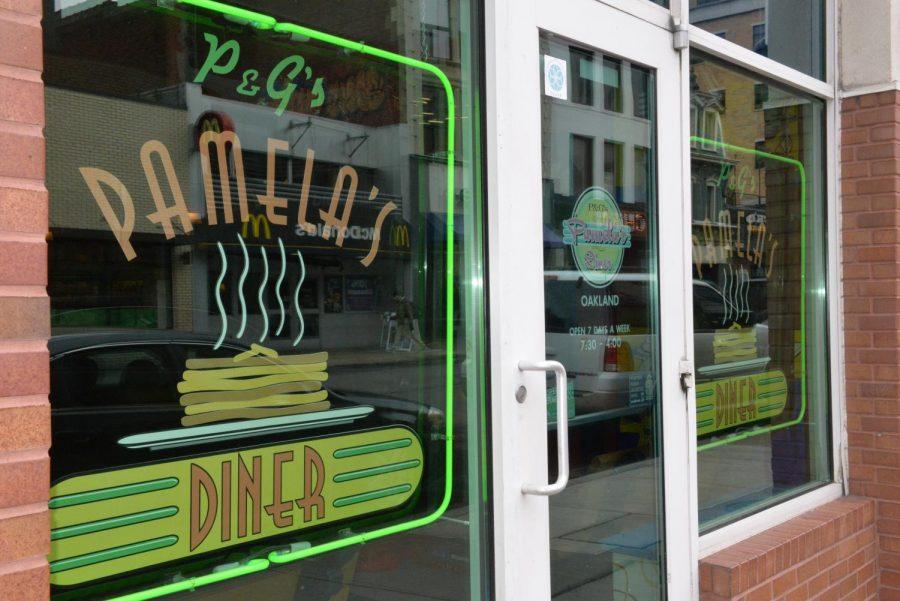Local restaurants capitalize on Pitt dining dollars program
The Pitt Eats Local dining program includes Pamela’s Diner, one of Pittsburgh’s hometown staples.
September 29, 2021
For Pitt students who get tired of on-campus dining options, they don’t have to journey far — or dip into their cash — to try something new.
Since the change in Pitt’s meal plan programs last year — which allocated 25% of dining dollars to be used at off-campus vendors — the Pitt Eats Local dining program continued cultivating connections with local businesses this year and encouraging students to explore Oakland.
When Pitt Eats Local initially began, Pitt officials said in an April press release that it was an “investment strategy” used to create a strong web of connections with local businesses. Currently, there are 31 vendors who participate in this program — most are located on the streets surrounding campus.
According to Quintin Eason, vice president of operations at Pitt dining contractor Compass Group, the partnership with local vendors helps support the local community.
“We wholeheartedly embrace the partnership with local vendors,” Eason said. “Participation in the program has grown and received positive reviews from the students.”
At last Friday’s Board of Trustees meeting, Chancellor Patrick Gallagher said the program shifted $772,000 in dining dollars to local restaurants in the last year.
Within this group of vendors, there are a variety of options for a student to choose from, such as CHiKN, Sorrento’s and The Milkshake Factory. There are also smaller restaurants a bit further away from campus as well, such as Mola, a sushi restaurant located on Penn Avenue, and Kiin Lao & Thai Eatery, a Laotian spot on Forbes Avenue. This program also includes both Pamela’s and Primanti Brothers, some of Pittsburgh’s hometown staples.
When the dining dollar program began in August 2020, it helped students combat their personal isolation, and also helped local businesses survive through pandemic-induced economic hardship. With pandemic restrictions easing, and campus returning to some normalcy, local vendors have ample opportunity to capitalize on the partnership.
Sandra Wittig, the general manager at ATARASHI, said this program has been so successful that their demographic includes even more Pitt students than in past years. Wittig said when comparing this year to last, there is a huge increase in the number of students paying in dining dollars — resulting in the store hitting record sale numbers.
“Last year during COVID, the number of Panther card transactions a day resembled the low numbers we see during holiday breaks,” Wittig said. “Now we are seeing lunch rushes where entire groups of 10 plus students in a row are using their Panther card to pay.”
Mike Damas, the manager at The Porch, said running the dining dollars program at the restaurant has been a great way to provide Pitt students with a nice meal over the past two years. Damas also said the program is simple and relatively easy to use.
But the program has caused complications for some restaurants. Wittig said she found the computer system used to process students’ ID cards to be slightly outdated. She also mentioned issues with manually inputting the customer’s total amount into the system, especially when there is a typo.
“We cannot issue refunds easily, we have to go through Pitt,” Wittig said. “We also cannot choose if it takes from Panther funds or dining dollars.”
Wittig said although the card reader system may not be the easiest to navigate, she thinks the dining dollar program hasn’t caused many problems overall. She said she doesn’t mind the extra steps it takes to run a Panther card through the restaurant’s machine.
“The system is pretty straightforward to run,” Wittig said. “Of course it takes longer than swiping a card, but we don’t mind the extra steps.”
Aside from dining dollars, Pitt students can use their Panther funds — an alternative to carrying around a debit card or cash — at business both on and off campus. Panther funds can be loaded online or in person at Panther Central with no minimum limit as to how much the student can deposit into their account. Damas said The Porch has accepted Panther funds from students for around 10 years.
Other than a few logistical issues, Wittig praised the program. As a 2019 Pitt alumnus, Wittig recalled how beneficial it was to switch up her meal options, and use funds from her Panther card at off-campus restaurants. She also commended Pitt students for their kindness and patience while using this program.
“Our student customers are probably the most patient and understanding visitors we have,” Wittig said. “A lot of students paying with their Panther cards leave us tips as well.”
The Pitt Eats Local program is just one way that local businesses can strengthen their ties to the community, and build relationships with their customers. Wittig said she’s happy her restaurant is a part of the program.
“We love seeing groups of students together,” Wittig said. “And we’re glad that we can be a part of the Pitt dining dollars program.”



